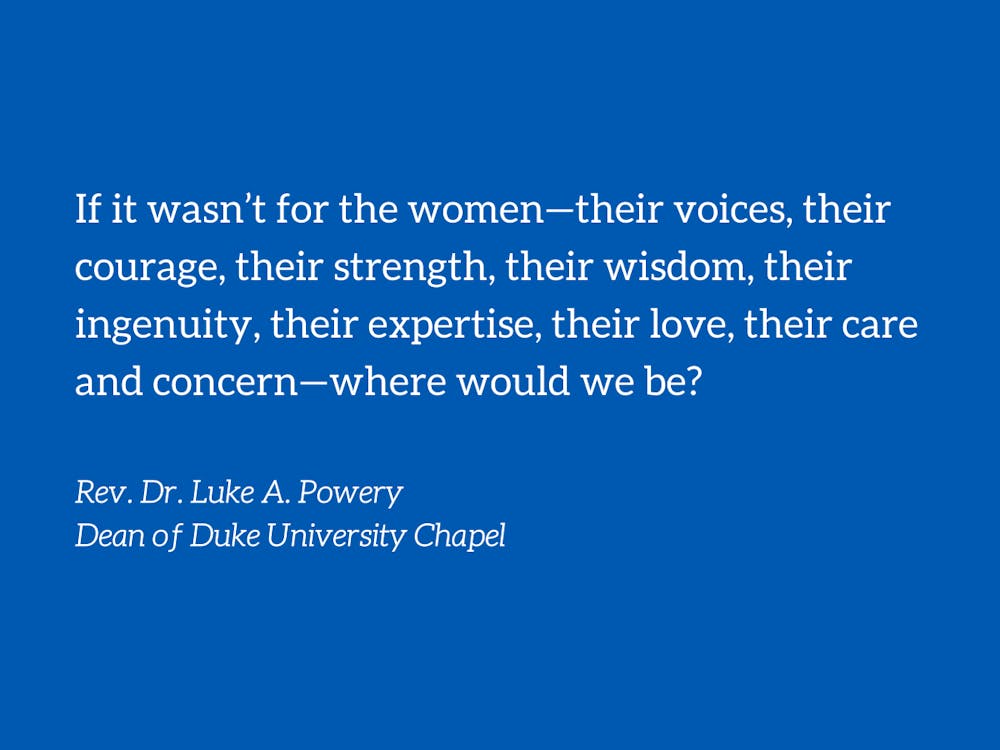It is still Women’s History Month, and I can’t help but think about all of the women who have made an imprint on our lives. “If it wasn’t for the women” is the expression sociologist Cheryl Townsend Gilkes uses when she describes the importance of women in the Black Church. She’s so right—and not just about the presence and work of women in the church to keep it going and thriving, but in all of life. If it wasn’t for the women—their voices, their courage, their strength, their wisdom, their ingenuity, their expertise, their love, their care and concern—where would we be?
In my own life, I can call the roll of the names of women who’ve blessed me. My grandma Alice. My mother Emittie. My mother-in-law Genevieve. My Aunt Ura, Aunt Leitha, Aunt Dor, Aunt Rachel. My sister Monique. My wife Gail and daughter Moriah. My first grade teacher Mrs. Ward. Second grade teacher Mrs. Esch who played the piano in class as we sang, “On top of spaghetti all covered with cheese, I lost my poor meatball when somebody sneezed….!!” Mrs. Oken, Mrs. Robbins, Mrs. Westbrook, Senora Otero, all in high school. Professor Hui, Professor McKee, Professor Duncan, and others in my undergraduate and graduate school years. I could keep naming the women who touched my life in some way—teachers and professors and preachers and administrators and food servers.
Thinking about the women in my life makes me all the more sad and infuriated about the recent murders of six Asian women in the Atlanta area. Imagine the gaping voids they leave behind in the lives of so many people—their children, their spouses, their friends, their colleagues. So much savvy and kindness and dedication were needlessly taken from the world. The injustice is stark, and yet the marks they left on so many people will be remembered.
The life and death of one young woman has had a profound effect on me. In December 2005, my 10-year-old niece, Christiana, the baby girl of one of my brothers, died from a rare auto immune disease, juvenile dermatomyositis. Only three out of one million children get it. It’s a long name for a disease that shortened her young life. There are no cures. One organ at a time stopped functioning. Here was a little girl, an athlete, who at the worst point couldn’t even put on a T-shirt or lift a towel off of a rack, or open a jar, because she was too weak. Her spirit was willing but her body was weak. Her IV needles were her nails, her hospital bed her cross. So even during this week, what Christians call Holy Week, I remember her suffering.
In the midst of her health challenge, Christiana kept a journal. She prayed for her own healing but many times at the end of journal entries she would pray for others. She prayed for her Aunt Gail, my wife, who was pregnant at the time, her uncle JM who was in the hospital, and for “the little baby next door in the hospital with the unknown liquid inside her body.” But there came a point when she couldn’t write in her journal anymore because she was too weak. And on the last day she could muster up enough strength to write, she was praying for others. Her last two words in the journal are the beginning of a prayer—“also touch.” That’s how her journal ends. “Also touch.” It’s an open-ended prayer for the world. There’s no ‘amen’ to conclude it because this prayer is not finished, but travels on in our lives as a prayer for you and me and everyone else in the world. “Also touch”—two small words from a woman that continue to speak to us today.
And there have been many other truthful, lifegiving, transformative words spoken and even sung by women. Remember, within the Christian tradition, it was a woman, Mary, who gave birth to God incarnate. If it wasn’t for the women, where would we be? This same Mary sings a song called “The Magnificat” that has reverberated all throughout the world for centuries. Described in the first chapter of the Gospel of Luke, it is a song of gratitude and joy, which begins:
“My soul magnifies the Lord,
and my spirit rejoices in God my Savior,
for he has looked with favor on the lowliness of his servant."
It is also a fierce song that demands justice:
"[God] has shown strength with his arm;
he has scattered the proud in the thoughts of their hearts.
He has brought down the powerful from their thrones,
and lifted up the lowly;
he has filled the hungry with good things,
and sent the rich away empty."
Mary’s words have shaped communities across the globe.
As we enter Holy Week culminating in Easter, I remember it was the women who first proclaimed the resurrection of Jesus. They went to tell others. They preached, and without them, we wouldn’t have heard this message of good news in order to proclaim it today. Their words to others continue to speak even as we speak a similar message that has been passed on throughout history, which began with them. If it wasn’t for the women, where would we be?
Who are, or were, the women who’ve impacted your life? Call them and thank them, not just this month but any time of the year.
Rev. Dr. Luke A. Powery is the Dean of Duke University Chapel. His column runs on alternate Mondays.
Want to respond to this opinion piece or submit one of your own? Visit this page for information on guest columns and letters to the editor.
Get The Chronicle straight to your inbox
Signup for our weekly newsletter. Cancel at any time.

